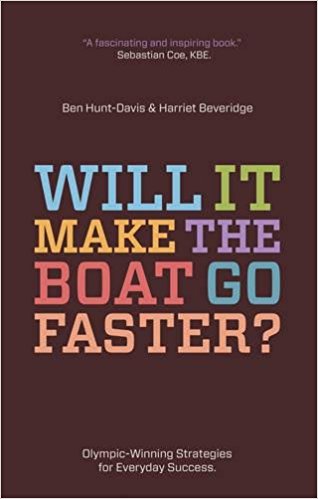Will It Make the Boat Go Faster Summary

5 min read ⌚

Olympic-winning Strategies for Everyday Success
Nowadays, it’s all about winning. Life is a competition and you’re nobody if you don’t win once in a while. Now, who would you rather have educating you how to win: a regular teacher or an Olympic gold medalist?
“Will It Make the Boat Go Faster” is a book written by one. Bonus: he won the gold medal by being part of a rowing team.
So, you can learn from him how to win, regardless of whether you’re a lone wolf, or a part of a large corporation, and irrespective of whether you are a staff member or a company manager.
Let’s get right to it!
Who Should Read “Will It Make the Boat Go Faster”? And Why?
Every so often, a sports analogy appears in a celebrated business book. This is because sports are great for analogies.
“Will It Make the Boat Go Faster” builds on this and it may be a useful book for anyone building a business strategy. But, ultimately, it will be more interesting to those who dream of becoming Olympic champions.
About Ben Hunt-Davies and Harriet Beveridge

 Ben Hunt-Davies is a former British rower turned author and performance expert. He won an Olympic gold medal at the 2000 Sydney Olympics, as part of the first British rowing team to do so since 1912.
Ben Hunt-Davies is a former British rower turned author and performance expert. He won an Olympic gold medal at the 2000 Sydney Olympics, as part of the first British rowing team to do so since 1912.
Harriet Beveridge is a performance and executive coach. She is the content writer for the online version of this course: https://www.willitmaketheboatgofaster.com/
“Will It Make the Boat Go Faster Summary”
No surprises here:
If you want to be a winner, set your goals right and set them from the start! And never forget that whether you’re going for a gold medal or for an employer of the month award, that it’s a marathon and not a sprint. So, split your goals into smaller chunks.
Olympians do this as well.
Hunt-Davies says that they split their goals into four layers: the crazy, the concrete, the control, and – no, it’s not another “c” – the everyday layer.
The crazy layer of your goal is, obviously, the outrageous one. And you can’t go much crazier than setting a goal to win an Olympic gold medal.
Of course, this is one of those goals which are basically going to float up in the air, driving you mad and making you feel much like Tantalus.
Unless you have a sound foundation.
That’s what the concrete layer is all about. The concrete layer is where the crazy layer becomes specific. So, winning a gold medal results in rowing 2km in 5 minutes and 18 seconds. That’s the world record and you’ll certainly get a gold medal with that time.
But, specific is not enough. You need to be in control of your goal as well.
And that’s the third layer. It means separating what you can from what you can’t control. You certainly can’t control the weather, for example, but you can control how often you would train.

And that brings us to the fourth and last layer: the everyday layer. Just like the second did for the first layer of your goal, the third does for the fourth one: it makes the control layer more specific. You can train every day, but now decide how much you’d train daily.
And start climbing the ladder from here to the top!
But, while doing it, make it at least somewhat entertaining. For example, training five hours a day is boring, but training with music isn’t. Dieting is not as much fun as eating chocolates, but signing up for pole dancing is fun and will help you get fitter as well.
Life’s not worth living if it isn’t fun. Can you spend a decade of your life doing things that aren’t entertaining? Of course, you can’t. And you shouldn’t.
Point taken.
Time for another: this all works well if you’re alone. If you’re part of a team, it’s merely the beginning. Because in a team, you will have to sacrifice your ego immediately. A great Navy captain thinks this. Disney more than approves it. And Olympians back it up.
There’s no “I” in team, you see, and, consequently, there are no several differing goals, but a single common objective. In its absence, there’s a team only on paper. In practice, there are still a few people competing one against each other.
If that doesn’t spell defeat, what does?
Speaking of defeats –
This is probably a good place to tell you that, on your road to greatness, there will be many. The point is to look at them as necessary steps to victory. Gradually, you’ll learn to soften the blows. Until, one moment, you become all but invincible.
Here’s an example:
You’re stuck in a traffic jam and late for a meeting. What do you do? Do you: a) start shouting at everybody and spent the first ten minutes of the meeting apologizing and talking about the traffic? or b) take a deep breath, accept the fact, and call the office to tell that you’re going to be late?
Of course, the rational answer is b. But, remember that – the next time you’re in a traffic jam. Soon enough, you’ll never be in a hold-up.
Get it?
Key Lessons from “Will It Make the Boat Go Faster”
1. Split Your Goals into Four Layers
2. There’s No “I” in Team
3. It’s Riskier Not to Risk
Split Your Goals into Four Layers
The main lesson of “Will It Make the Boat Go Faster” is this one: whenever you have a goal, you have to split it in at least four layers.
The crazy one is for the objective you can only daydream about. The concrete one is for specifying this objective into measurable quantities. The control layer is for deciding what you can, and what you can’t influence. Finally, the everyday one is for your day-to-day training program.
That way, you can achieve crazy heights by simply doing everyday things.
There’s No “I” in Team
This is an old adage and you probably already know it. But, it’s important to repeat it. Because, teams are built around common objectives, and because no team of brilliant individuals will ever win unless they decide to think and work as one.
So, site down and take notes: speak to every member of your team and decide together on the shared objective.
It’s Riskier Not to Risk
It’s paradoxical, but it’s true: if you don’t risk, you’ll lose nothing. But, you’ll win nothing as well. And you only live once.
On second thought, we’ll let Mark Twain tell you something about this: “Twenty years from now you will be more disappointed by the things that you didn’t do than by the ones you did do. So, throw off the bowlines. Sail away from the safe harbor. Catch the trade winds in your sails.”
Like this summary? We’d Like to invite you to download our free 12 min app, for more amazing summaries and audiobooks.
“Will It Make the Boat Go Faster PDF Quotes”
A goal is simply where you are going. Share on X Whatever our goal is, if we are aware of what we want, then it’s much easier to work towards achieving it. Share on X The stronger our belief in goals, the more likely we are to get off our backsides and build them. Share on X When we have a clear goal, it acts like a magnet drawing us forwards. Share on X Research suggests that we tend to regret what we haven’t done much more than what we have done – even if we screwed up in doing it. Share on XOur Critical Review
“Will It Make the Boat Go Faster” is called a book written by winners – for winners. This is true, but only if you are a bit more specific. Not that the book isn’t great, but we guess it’s more about Olympians than for regular people.
Because, business-wise, there’s nothing really new here other than some real-life examples which – forgive us for saying – are for superhumans.








